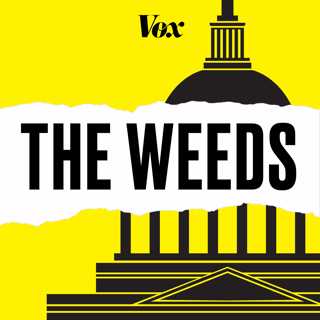
The candidates haunting the GOP
The midterm elections are four weeks away. Senate control is on the line, and races in battleground states are tightening. Few things say “close election” like an October surprise. The one getting the latest buzz this election cycle comes from Georgia, courtesy of Republican senatorial candidate Herschel Walker. Vox politics reporter Li Zhou (@liszhou) explains the race, and Rutgers professor David Greenberg (@republicofspin) tells us the origin of the October surprise. References: Herschel Walker is an epically flawed candidate. He could still win. Hosts: Jonquilyn Hill (@jonquilynhill) Credits: Sofi LaLonde, producer and engineer Libby Nelson, editorial adviser A.M. Hall, deputy editorial director of talk podcasts Learn more about your ad choices. Visit podcastchoices.com/adchoices
11 Loka 202244min

AMERICA HAS A (POLLING) PROBLEM
Pollsters are starting to panic. There’s headline after headline after headline ahead of the midterms on whether this election cycle’s polling is accurate or not. How does polling actually work? Is it really representative of how voters are feeling and what the outcome will be on Election Day? And when it comes to Democrats, why is polling so wrong? Amy Walter, publisher and editor-in-chief of the Cook Political Report, explains why polls are complicated, lessons to learn from past elections, and what we could expect this November. References: Which Midterm Polls Should We Be Taking With a Grain of Salt? Pollsters fear they’re blowing it again in 2022 Hosts: Jonquilyn Hill (@jonquilynhill) Credits: Sofi LaLonde, producer and engineer Libby Nelson, editorial adviser A.M. Hall, deputy editorial director of talk podcasts Want to support The Weeds? Please consider making a donation to Vox: bit.ly/givepodcasts Learn more about your ad choices. Visit podcastchoices.com/adchoices
4 Loka 202254min

Abbott and DeSantis: Stunt queens or policy makers?
US immigration policy is complicated. And when Republican Govs. Greg Abbott and Ron DeSantis chartered buses and planes to relocate migrants to “blue cities,” it raised a ton of legal questions. But it also ignited the age-old question about our immigration system: Why is it so complicated? Weeds veteran Dara Lind (@DLind) explains. References: Why Ron DeSantis is baiting Biden on the border Opinion | Ron DeSantis Is Making an Asylum Crisis of His Own Host: Jonquilyn Hill (@jonquilynhill), Vox senior producer Credits: Sofi LaLonde, producer and engineer Libby Nelson, editorial adviser A.M. Hall, deputy editorial director of talk podcasts Want to support The Weeds? Please consider making a donation to Vox: bit.ly/givepodcasts Learn more about your ad choices. Visit podcastchoices.com/adchoices
27 Syys 202247min

The fastest growing voting bloc in America
For the September issue of The Highlight, the Vox politics team examined the fastest growing voting bloc in the country: Latino voters. But the 32 million voters that make up the Latino electorate are not a monolithic group. In today’s episode, we’ll look at the intricacies and nuances of the Latino voting bloc and what might happen in the 2022 midterm elections. References: Ruben Gallego's ready for a fight — even if the Democratic Party isn't Yes, most Latinos are Christian. No, that doesn't make them anti-abortion. Latino voters are being flooded with even more misinformation in 2022 The full September issue of The Highlight from Vox Hosts: Marin Cogan (@marincogan), senior correspondent Christian Paz (@realcpaz), senior politics reporter Nicole Narea (@nicolenarea), politics reporter Credits: Sofi LaLonde, producer and engineer Libby Nelson, editorial adviser Amber Hall, deputy editorial director of talk podcasts Want to support The Weeds? Please consider making a donation to Vox: bit.ly/givepodcasts Learn more about your ad choices. Visit podcastchoices.com/adchoices
20 Syys 202257min

Who decides how we’ll save the future?
How do we make life better for future generations? Who gets to make those decisions? These are tough questions, and today’s guest, philosopher William MacAskill (@willmacaskill), tries to help us answer them. References: What We Owe the Future by William MacAskill Effective altruism's most controversial idea How effective altruism went from a niche movement to a billion-dollar force Effective altruism’s longtermist goals for the future don’t hurt people in the present Hosts: Bryan Walsh (@bryanrwalsh) Sigal Samuel (@sigalsamuel) Credits: Sofi LaLonde, producer and engineer Libby Nelson, editorial adviser A.M. Hall, deputy editorial director of talk podcasts Want to support The Weeds? Please consider making a donation to Vox: bit.ly/givepodcasts Learn more about your ad choices. Visit podcastchoices.com/adchoices
13 Syys 20221h 4min

Vitamin X
Today on The Weeds, we are sharing an episode of another Vox podcast, Unexplainable, that originally aired in June 2022. Millions of Americans take dietary supplements — everything from vitamins and minerals to weight-loss pills and probiotics. But because supplements are loosely regulated in the US, their makers don't have to prove that they work, or even that they are safe. Full transcript available here. Want to support The Weeds? Please consider making a donation to Vox: bit.ly/givepodcasts Learn more about your ad choices. Visit podcastchoices.com/adchoices
6 Syys 202234min

It’s a policy team takeover!
Join editor Libby Nelson (@libbyanelson) and reporters Rachel Cohen (@rmc031) and Madeleine Ngo (@maddiengo) for a summer policy wrap-up. Inflation, the economy, and gas prices were on everyone’s minds, but we have even more policy news to talk about. Both Congress and the Biden administration made one last late-summer policy push with the Inflation Reduction Act and student loan cancellation. What does this all mean for you? Listen to find out! References: School vaccine mandates for Covid-19 are not happening Will student loan forgiveness make inflation worse? Inflation is finally slowing down. Will things get cheaper? The inflation numbers are bad — but how bad are they? GDP declined again — but that might not mean we're in a recession ”Standard Oil” octopus cartoon Credits: Sofi LaLonde, producer and engineer Libby Nelson, editorial adviser A.M. Hall, deputy editorial director Want to support The Weeds? Please consider making a donation to Vox: bit.ly/givepodcasts Learn more about your ad choices. Visit podcastchoices.com/adchoices
30 Elo 202241min

The rebirth of industrial policy
Vox senior correspondent Dylan Matthews sits down with Felicia Wong (@FeliciaWongRI), president and CEO of the Roosevelt Institute, to talk about a new era of industrial policy. They discuss the theory of modern supply-side economics, the passage of the Inflation Reduction and CHIPS acts, and how much common ground exists between the political left and the right. Hosts: Dylan Matthews (@dylanmatt), senior correspondent, Vox Credits: Sofi LaLonde, producer and engineer A.M. Hall, editorial director Want to support The Weeds? Please consider making a donation to Vox: bit.ly/givepodcasts Learn more about your ad choices. Visit podcastchoices.com/adchoices
23 Elo 202250min






















